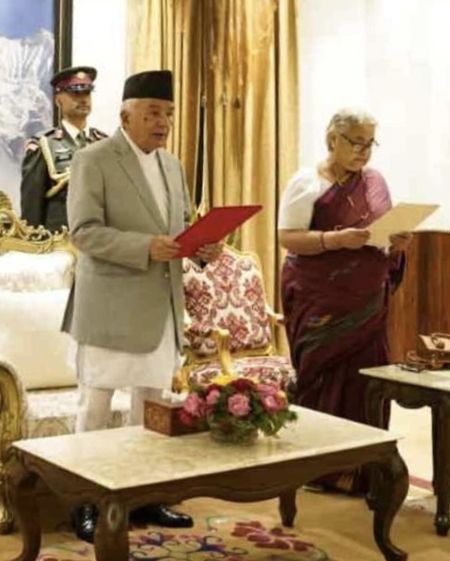
New Delhi — Calm has returned to Nepal with the swearing-in of Shushila Karki as the country’s new interim Prime Minister. Karki, who previously served as Nepal’s Chief Justice, assumed leadership following violent protests led by Gen Z activists, which ultimately forced Prime Minister K.P. Sharma Oli and dozens of his ministers to resign.
Initially, many observers feared that the political crisis might drag on. However, decisive interventions by President Ramchandra Paudel and Army Chief General Ashok Raj Sigdel ensured a swift transition. The President issued a stern message to Gen Z leaders, urging them to appoint a new leader without delay, stressing that upholding the Constitution was paramount. He also made it clear that failure to act promptly could not later be blamed on him, warning against any further chaos that might erupt from procrastination.
With this leadership change, India is now expected to play a more active and visible role in Nepal’s political landscape. According to Indian officials, a diplomatic reset is already in motion, and New Delhi is optimistic that Karki will be far easier to engage with than her predecessor Oli.
For India, the immediate priority is to move fast in re-establishing strong ties and to reach out to Nepal’s Gen Z movement, which has emerged as a significant political force. Officials believe that raising awareness among Nepal’s younger generation about the depth of India–Nepal relations is crucial at this juncture.
Under Oli’s leadership, Kathmandu’s tilt towards Beijing became increasingly evident, and his rhetoric often took on an anti-India tone. New Delhi is fully aware of China’s growing influence in Nepal over the past few years and sees the current transition as the best opportunity to counter negative perceptions and rebuild goodwill.
Although India and Nepal share deep historical ties, relations have been strained in recent years. Strengthening these bonds is vital not only for diplomatic reasons but also for India’s security concerns. Indian intelligence agencies have repeatedly warned that instability in Nepal can directly affect India’s security. The ISI, Pakistan’s intelligence agency, has used the Nepal route into India on several occasions. Any renewed instability would allow such networks to thrive, as Nepal’s security forces would be preoccupied with managing internal unrest instead of focusing on border security. This would leave India’s agencies burdened with the entire responsibility of monitoring and managing the border, which becomes much harder when cooperation from the other side is weakened.
With the arrival of a new leadership in Kathmandu, India is expected to address these issues promptly and expedite long-pending border infrastructure projects, which are in the shared interest of both nations.
Though Karki lacks political experience, she enjoys a strong reputation as a staunch anti-corruption figure. Her immediate priority is expected to be the restoration of political stability and normalcy within Nepal, before shifting her attention to foreign diplomacy. Indian officials, however, remain confident that under her leadership, ties will improve. They believe Karki fully understands the historic partnership between India and Nepal and acknowledges India’s support to her country at critical junctures.
Karki also has a personal connection to India. While studying at Banaras Hindu University (BHU) in Varanasi, she met Durga Prasad Subedi, who later became her husband. Subedi, a member of the Nepali Congress, was involved in the dramatic 1973 hijacking of a domestic Nepal Airlines flight, which was carrying 4 million Nepalese rupees. The plane was forced to land in Forbesganj, Bihar, where the cash was unloaded. The operation was bloodless, and no passengers were harmed.
The money was handed over to Girija Prasad Koirala, who was waiting on the Indian side of the border. The funds were later used to procure arms for the Nepali Congress’s armed struggle against the monarchy. Koirala himself went on to become Prime Minister of Nepal four times, shaping the country’s democratic journey.
With inputs from IANS